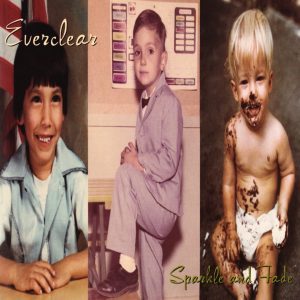Heartspark Dollarsign by Everclear (1995)
Heartspark Dollarsign is a song released in May 23, 1995 written by lead singer Art Alexakis before joining the band Everclear, formerly he was in the band Colorfinger. The song became a third single release from the American rock band of their second album, Sparkle and Fade. Heartspark Dollarsign reached the top 50 in Australia and the United Kingdom’s music chart and became the first song to chart on the Billboard Hot 100 in number 85, June 1996. [1] This song based on the vocalist’s personal story of his interracial relationship when he faced opposition from his mother for dating a black girl. [2]
Controversy
The lyrics describe an interracial relationship that no one approves as one of his relationships with a black girl did not being approved by their mothers and had to end up after three weeks being together. [3]
In an interview with Spin, Everclear’s Art Alexakis shared his story about the song “Heartspark Dollarsign” and his personal stories connected to the song:
"I’ve always wanted to talk about racial things. “Heartspark Dollarsign” was written in my previous band, called Colorfinger, which originally I wanted to call “Colorblind.” So there’s always been that aspect of — you know, I grew up in a black neighborhood, so the things that concerned a lot of people didn’t concern me. I’d always been a pretty sexually charged kid, and I had girlfriends at a very early age. If you look at all the women I’ve ever dated, there’s no type. I don’t have a type. I think beauty and intelligence and humor, those are devoid of type. I liked every type of gal, back when I was dating. My mom, you have to give her credit. She’s from the Deep South, from the Depression; she wasn’t overtly racist, she didn’t use the n-word, she would smack us if anyone even hinted at something like that. To be compassionate to her, it’s really hard to shake what you learn when you’re a kid for some people. Not for everybody, but for some people. And me dating black girls and Asian girls and Hispanic girls, Filipino girls was hard on her. I think the hardest one for her, which is sad to say, was the Jewish girl. She wasn’t “rich rich,” but for as poor as we were, she was pretty well-off. It might have been more the money thing than it was the Jewish thing. But anyway, I dated a [black] girl, and it was this three-week whirlwind — like, from the time we looked at each other across the room, it was on, you know? It was just on. And she came out to meet my mom, and my mom was horrible to her. And the next day we went and met her parents. Her mom was half-black, half-white and her dad was black, and he was nicer to me than her mom. Her mom was just flat out like, “You shouldn’t be here.” She just didn’t want any part of that world, and it affected our relationship. We were young enough that we weren’t in a place where we could go tell the world to go f—k itself. We said we were, but we really weren’t. Not at that point. And that’s what that song’s about, is just embracing the value of love and passion — your heart." [4]
Adding on one interview with, he also tells that the song relating to the world that love should and could be blind:
"Heartspark Dollarsign is actually quite an uplifting song, relating to the world that love SHOULD and could be blind, as long as we simply let it be. I attempted to find out if this song was autobiographical for Alexakis, but all I really found was rumor and conjecture. Regardless, whether it is based on a true story, or just written to send a message, it works on that level. Twenty years later, with everything that’s going on in this crazy, sick world of ours, everybody can use this kind of inspiration." [5]
Below is the controversial lines telling his youth's interracial relationship in Heartspark Dollarsign by Everclear :
My mom said not to bring her around
Cause she's black
My family will put her down
I'll break the white-trash ties that bind
Trade a love so pure for a hate so blind [6]
References
- ↑ https://en.wikipedia.org/wiki/Heartspark_Dollarsign
- ↑ https://genius.com/Everclear-heartspark-dollarsign-lyrics
- ↑ https://en.wikipedia.org/wiki/Heartspark_Dollarsign
- ↑ https://www.spin.com/2015/06/everclear-art-alexakis-sparkle-and-fade-interview-summerland/
- ↑ https://noseatbeltblog.com/2015/11/24/everclear-heartspark-dollarsign/
- ↑ http://www.edchange.org/multicultural/arts/race_songs.html
